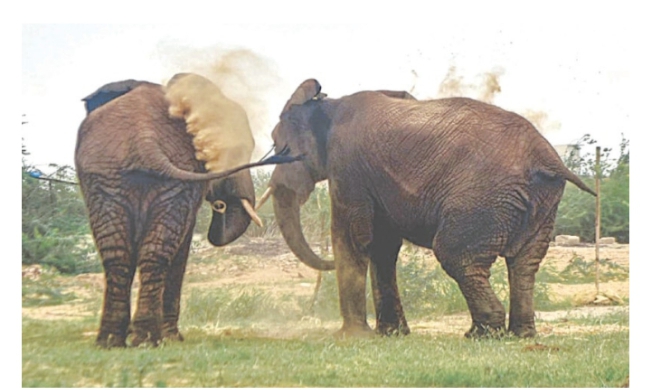Sonia, an African elephant, along with three other young female elephants, was captured in the wild in Tanzania in 2009 and brought to the Karachi Safari Park. After years of separation, Sonia, aged 17-19, was recently reunited with her sister Madhubala. However, as luck would have it, she died within two weeks of her transfer in Dec 2024.
The transfer had offered a brief moment of hope for the elephants, who had endured years of captivity and isolation. While Sonia showed signs of recovery, the Task Force on Captive Animals in Sindh acknowledged their failure to address Sonia’s condition on time, expressing shared responsibility for the loss.
With only two surviving sisters left, Madhubala and Malika, this loss serves as a painful reminder of the ongoing challenges facing captive animals in Pakistan. Sonia’s death highlights the urgent need for better care and treatment of animals in captivity. The death marked yet another grim chapter in Pakistan’s troubling history of captive animal care. While it is claimed that there was no negligence on the part of the Safari Park administration in her death, the grim reality of zoos across Pakistan hinted at a different reality. Time and again, these facilities have demonstrated a glaring lack of care, expertise, and commitment to animal welfare.
After she was brought from Tanzania at a young age, for over a decade, Safari Park incorrectly identified her as male – a glaring oversight. In the months leading up to her death, Sonia’s deteriorating health was well-known to the park authorities. Yet, despite this knowledge, she spent her final days confined to an enclosure Globally, there is a growing consensus that traditional zoos, which prioritize human entertainment over animal welfare, are relics of the past. Sanctuaries and conservation centers designed to mimic natural habitats are the modern standard. Pakistan’s zoos and safari parks, however, continue to operate under outdated and exploitative models, often failing to meet even the most basic standards of care.
This status quo is neither sustainable nor acceptable. Zoos across Pakistan need to be revamped or closed down, and the animals housed within them must be relocated to sanctuaries or conservation centers where their welfare can be prioritized. The government must invest in partnering with international organizations to develop sanctuaries that can house these helpless animals. It must also enforce strict regulations and ensure accountability for negligence to protect these voiceless animals from harm or neglect.

